Essential Books for Writers
Writers do not have some magical super power that allows the first thing they write to be a beautiful masterpiece. However, when it comes to creative writing, there seems to be this illusion that writers can just sit down and let the Next Great American Novel pour out of their souls. Writers take years to hone their craft: they continually revise, workshop and discuss their pieces, and study works of other writers. What better to study than writers who have written about writing? Here is a list of essential books for writers at every stage of the process.
Writing Magic: Creating Stories that Fly by Gail Carson Levine
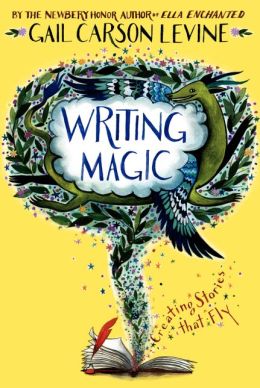
This is a great book for getting started. In fact, one of the first chapters is actually entitled “Getting Started”. Gail Carson Levine, author of countless children’s and young adult books, as well as the recipient of the Newberry Honor, offers fun writing prompts to inspire our inner writer. Levine dedicates a lot of her time giving writers tips to break through writer’s block and how to handle the feeling of being stuck. Most importantly, she addresses the little voice in the back of our head that makes us doubt ourselves, and then lists exercises that will help shut up that little voice. Known for her strong characters – remember Ella from Ella Enchanted? – Levine’s understanding of character shines through as she offers advice how to create characterization through dialogue and create realistic motives and reactions. This is a great read for anyone who loves writing and just needs some help taking the first step.
Bird by Bird: Some Instructions on Writing and Life by Anne Lamott
Anyone who has ever been afraid of drafting, this is the book for you. In fact, she has a whole chapter dedicated to “Shitty First Drafts”, where she acknowledges that horrible first drafts are necessary. She states that the first draft is like a child’s draft where you can allow yourself to write freely whatever comes to mind without worrying about how it sounds. Lamott advises writers to write more than what’s needed in order to find what’s important. Later, after the words are on the page, you can sift through what’s necessary and what’s not. Bird by Bird focuses on taking things one step at a time and not getting overwhelmed by the work in front of you. It was inspired by a memory of her younger brother who had to write a report on different types of birds for school and had procrastinated until the very last day. Paralyzed with anxiety on trying to finish the essay in a day, his father told him to just write, “Bird by bird,” lending its title to Lamott’s guide to writing.
Eats, Shoots & Leaves: The Zero Tolerance Approach to Punctuation by Lynne Truss
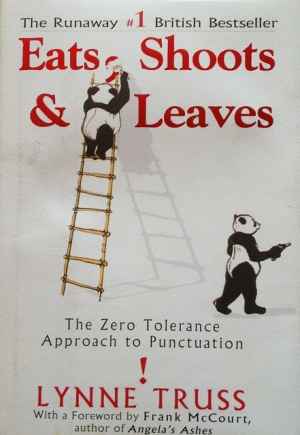
The title of this book alone shows the importance the power of one comma. It is a great read to make writers appreciate grammar and editing. Although, Truss writes on a subject that might make some writers cringe – because, let’s face it, we would rather focus on plot or characters than punctuation – she does it with such a sense of humor that keeps readers engaged. She has countless zingers like, “No matter that you have a PhD and have read all of Henry James twice. If you still persist in writing, ‘Good food at it’s best’, you deserve to be struck by lightning, hacked up on the spot and buried in an unmarked grave,” or, “Why did the Apostrophe Protection Society not have a militant wing? Could I start one? Where do you get balaclavas?” If you are a writer who dreads editing and is still perplexed by grammar, this is a great book to get you through the editing process by offering you a swift kick in the pants. Despite all of her humor, Truss is very serious about the significance of punctuation: “Proper punctuation is both the sign and the cause of clear thinking.”
On Writing: A Memoir of the Craft by Stephen King
When exploring the fiction craft, who better to turn to than authorial legend Stephen King? In On Writing, King explains the effect writing has had on his life and intertwines advice about the writing craft with the story of his own rise to becoming one of the most commercially successful writers of all time. This book is great for aspiring writers and fans of King alike. His biggest advice to writers is to read. After all, “You cannot hope to sweep someone else away by the force of your writing until it has been done to you.” His advice for writers may be a little intimidating: he says that all novels should be written in no more than three months in order to keep the story fresh. Although the idea alone might strike fear into the hearts of writers everywhere, King provides ample inspiration for getting started, motivation to keep writing, and descriptions of the ideal writing environment: “So okay― there you are in your room with the shade down and the door shut and the plug pulled out of the base of the telephone. You’ve blown up your TV and committed yourself to a thousand words a day, come hell or high water. Now comes the big question: What are you going to write about? And the equally big answer: Anything you damn well want.”
Making Your Own Days: The Pleasures of Reading and Writing Poetry by Kenneth Koch
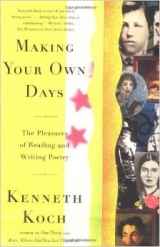
Let’s not limit these essential books just to works about writing fiction. There are equally amazing books out there about the craft of poetry. In this book which is part guide to writing poetry and part anthology of great poems, critically acclaimed poet Kenneth Koch explains that the most important part of poetry is the effect it has on its readers. Koch offers his readers tools to improve their own poetry, combined with notable poets who exemplify what he is teaching. It gives readers the chance to learn about the use of certain poetry conventions and the development of modern poetry. In fact, he believes that poetry is its own separate language – not just special treatment of an existing one. Even for writers who do not consider themselves poets, this book is worth a look to pique one’s interest and appreciation of poetry.
First You Write: The Worst Way to Become an Almost Famous Author and the Best Advice I Got While Doing It by Joni Rodgers
This eBook by New York Times Bestseller Joni Rodgers is only 57 pages. When asked why she kept the book so short, she said because the best writing advice she got was very brief, “Stop kvelling and get back to work.” The publication of this little book caused quite a stir because Rodgers, backed by a major literary agency and her success, chose to publish it through an indie publishing company because she thought it was most fitting for this particular work. She discusses where she sees the publishing industry going and what that means for new or emerging writers. She encourages writers to maintain their artistic integrity by experimenting in their work and exploring their inspirations and motivations for writing. According to Rodgers, “What sells a book sells a book, same in traditional or self-publishing. You gotta shake your tail feathers.”
These books are useful, but the best way for writers to learn their craft is through reading as often as they can. Reading and writing are so interdependent that, according to Stephen King, “If you don’t have time to read, you don’t have the time (or the tools) to write. Simple as that.” So, go pick up one of these books and start writing.
Works Cited
“Bird by Bird: Some Instructions on Writing and Life.” Goodreads. Goodreads Inc., n.d. Web. 20 Mar. 2015
“Eats, Shoots & Leaves: The Zero Tolerance Approach to Punctuation.” Goodreads. Goodreads Inc., n.d. Web. 20 Mar. 2015
“First You Write: The Worst Way to Become an Almost Famous Author and the Best Advice I Got While Doing It.” Goodreads. Goodreads Inc., n.d. Web. 20 Mar. 2015
“Making Your Own Days: The Pleasures of Reading and Writing Poetry.” Goodreads. Goodreads Inc., n.d. Web. 20 Mar. 2015
“On Writing: A Memoir of the Craft.” Goodreads. Goodreads Inc., n.d. Web. 20 Mar. 2015
“Writing Magic: Creating Stories that Fly.” Goodreads. Goodreads Inc., n.d. Web. 20 Mar. 2015
What do you think? Leave a comment.
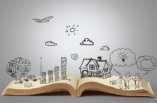
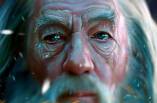
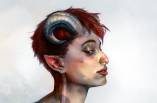
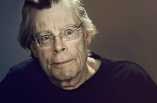
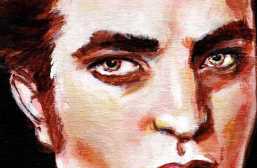
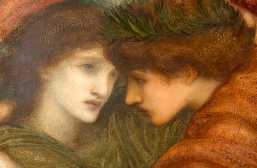
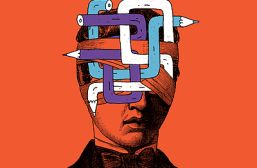
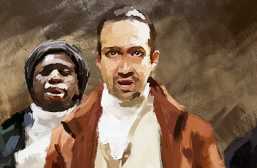
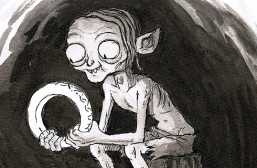
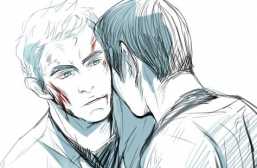
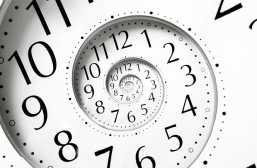
Thank you for putting this article together you bring out some great reference material.
This is just what I needed right now. Thanks for this wonderfully useful resource.
If you are a writer, you should definitely read A Portrait of the Artist as a Young Man, to see just how far writing can go. As well as The Odyssey, since it’s the first real story.
What an interesting list. I’ve only read two of these.
Thank you. I have some more reading to do!!
I blame my dad for convincing me to love books…he had a ton of them in our home,,,he also sold rare books. Now I have a huge collection of books and everyday I collect some more.
BIRD BY BIRD is my absolute favorite. Steven King’s book ON WRITING: A MEMOIR OF THE CRAFT is great too. Believing in yourself helps you strike out and write your own book.
Thanks, Beth.
this is a timely list for me. i was just thinking about which writing books i must add to my must-read list. thanks!
I would also add Steven Pressfield’s book “Turning Pro.” Really helpful when needing that extra motivation. Well written as always …
The only books about writers I’m familiar are On Writing Well by William Zinsser and the Elements of Style (that’s a classic). Thanks for introducing me to the others.
I just read Stephen King’s book for the first time — F A N T A S T I C, inspiring, and practically useful.
Amazing Post..I just like to add a personal favorite of mine..Syd Field’s SCREENPLAY..Not only does it suitable for a movie writer but also any aspiring novelist should try & learn from this legendary book..
I’m a sucker for books on writing – the catch is I have to remind myself to read them! Another favourite of mine is Walking on Alligators by Susan Shaughnessy. I’d dare anyone to pick up that book, read a few pages and not sit down to write after – it’s that motivating!
Bones and Bird by Bird is absolute must haves, as is King’s On Writing.
Great suggestions, but I’d like to add one: The Fire in Fiction, by Donald Maass. One of the greatest, most helpful books on writing craft I have read. A real must-read!
You have some good suggestions, some of which I’ve already discovered, and some that are new to me. I’d suggest, for memoir writing, “Your Life As Story” by Tristine Rainer.
It’s like you’ve read my mind. I was looking for some good books to help my writing 🙂 I’ve added some to my ever growing to-read list
There’s a bit of me that thinks I should go out and buy these books, but I know deep down I know what to do, I just need to sit down and write my shitty first draft!
Thank you! This was just what I was looking for.
Love books on writing, as the more help the better! I would add The Right to Write: An Invitation and Initiation into the Writing Life by Julia Cameron, How to Write a Novel by John Braine and Writing a Novel by Nigel Watts. These have been very helpful and give practical exercises too.
Thanks, you guys are rolling some amazing stuff here!
I recommend Stein On Writing by Sol Stein for anyone who wants to write, is writing or has written. It’s my Bible. Sadly, I don’t have a copy yet – I depend on the school library, and i swear the slip of paper that has the ID numbers of people that have borrowed that book will need to be replaced soon. Very soon, if I have my way.
Could you – and everybody here – help to choose the necessary books for a non-native “English writer”? I’ve read Stephen King’s book On Writing (to say nothing of all his other books). Is there anything else “absolutely necessary” to develop a good “English style”, in general?
The Elements of Style,(Strunk and White). Purchase the revised copy. It is truly a writer’s ABC.
I try to check this out and this will also serve as a good resources to all writers especially those beginners like me. Thanks a lot for sharing this.
Read most of these, but not all of them. The rest have been added to my (ever growing) reading list. My favorites on here are Stephen King’s On Writing.
The one book I would add, if I may, is Jurgen Wolff’s ‘Your Writing Coach’. In the early days, I needed books that actually got me writing, rather than reading about writing (though those are good, too), and this was about the only book of its kind that I actually got through, right to the end.
The JOY OF BOOKS ON WRITING… after writing for many years I still thrill to a good book on writing. It proves to me how deeply runs our need to write. And read. It’s like all these books are trying to uncover a mystery… “how it’s done”. Thankfully, we may never know.
I would add Writing Tools: 50 Essential Strategies for Every Writer. The most practical book on writing I own. Tons of helpful exercises (fifty, of course).
These are all good books and I’ve read most of them.
The only book I would add is “Writing with Style” by John R. Trimble. “On Writing Well” is great, but “Writing with Style” is even better.
Great list; thanks!
I’d add The War of Art by Steven Pressfield.
http://www.stevenpressfield.com/the-war-of-art/
Great list with great resources for the future! Thank you!
Great suggestions! I also like Steven Pinker’s The Sense of Style and Arthur Plotnik’s Strunk and Bite.
Great suggestions! I also like Steven Pinker’s The Sense of Style and Arthur Plotnik’s Spunk and Bite.
NCY vs MFA book is a good read, if you’re a writer, check it out. As for this list, it’s cool, an alternative to the usual stuff out there which always includes John Cheever and Raymond Carver.
As an aspiring writer, this is definitely something that I needed to see. I haven’t read any of these books, but based on what you’ve said about them, it sounds like I would get much more out of these books than these college textbooks that teach you how to write like a machine. Great job!
Thanks for this. It was very timely.
Thank you for mentioning On Writing: A Memoir of the Craft. It is not given enough credit, it is one of the most inspiring on writing books I have read. Thank you for the list, saving for future reference.
For Canadian writers out there, there are a couple writing books written by award-winning Canadian authors that may also be helpful:
The Joy of Writing: A Guide for Writers Disguised as a Literary Memoir by Pierre Berton
Thing Feigned or Imagined: A Self-directed Course in the Craft of Fiction by Fred Stenson
I am an aspiring editor therefore I found this article very constructive. Since I focus mostly on editing and not so much on my creative side, I think that some of these books will help me get past my inner thoughts that tell me what I am writing is terrible. Not only is creativity important but good punctuation and grammar is as well, so I think that I will definitely be picking up Lynn Truss’s book in order to improve my editing skills! This is my first comment on The Artifice and I am really looking forward to writing some articles of my own and this was a great first article to get things started!
To this list I would recommend: A Passion for Narrative: A Guide to Writing Fiction by Jack Hodgins (2001). This has an excellent section on Misdirection. Hodgins introduces a real-life news story and bases several concrete exercises on the story. I worked through several chapters and found my stories improved… and I was reading real-life news stories with even greater interest than before.
Thank you for this list of books I didn’t know. Another book that has inspired me is George Orwell’s “Why I Write.”
Good variety of books! I also like Zinsser’s “On Writing Well”.
I firmly believe that all writers should own a copy of Strunk and White’s “The Elements of Style”, and should read it- it’s the essential grammar text. I’m also fond of Jack Hodgins’s “A Passion for Narrative”, and have found a number of other, less general writing reference books useful from time to time. Writer’s Digest publishes a number of writer’s references, including the “Character Naming Sourcebook”, which I love.
This is a great list! It has a book for almost every problem I’ve ever faced as a writer. I still face them so thank-you for giving me the solutions!
I found this list of resources incredibly useful for anyone who is passionate about writing – myself included! I have read a few already and you have introduced me to others I will be sure to drink in soon enough. I appreciate any background reading that will help make me the best writer I can become.
You are a gem for this. I did not even know books for how to write existed. I have always been taught, you either have it or you don’t. Thank you
Cool, some new writing books to check out.
Nonfictions books on writing are always tough for me to stomach, often because it seems people that write them have rarely written anything else. One thing that might be interesting is a list of fiction books that reflect stages of the writing process.
As an aspiring writer with a penchant for being rigorously correct while straying from cliches, this is a great list that I can refer back to later. In fact, I’m almost certain that the Lynne Truss book here is required for a course of mine coming up. Thanks!
This is a great list of resources for writers! We were just discussing Anne Lamott’s “Shitty First Drafts” in my Craft of Writing class the other day. Thanks for the info and guidance!
Thank you for this helpful list! I haven’t read a single one, sadly. I would also add On Writing Well by William Zinsser–literally one of the best books on writing I’ve ever discovered. It really stresses simplicity and clarity.
Bird by Bird is a really inspiring book. I’ve recommended it for several people and they are exciting too. In other hand, it’s necessary to remember that good teacher is a practice. But good book is an excellent inspiring tool.
“You cannot hope to sweep someone else away by the force of your writing until it has been done to you.” How incredibly true– one cannot know the force of literature without first experiencing it.
Great list! I will definitely search for some of these.
I need to check out some of these books. Pretty cool, thanks for the info.
Definitely need to check out Stephen King’s book!
Interesting post, I’m looking to hone my writing abilities and I will definitely look into some of these pieces. I’m surprised that The Elements Of Style By William Strunk Jr and E.B. White.
I agree with all these great book recommendations, and would like to add Jeff VanderMeer’s Wonderbook: The Illustrated Guide to Creating Imaginative Fiction. I use this a lot the graphics are really good and there is such a wealth of information inside!
Thanks ekeating! I’ve got to get a copy of “Bird by Bird.”
They Say, I Say is really helpful for academic writing. Writing Fiction from The Gotham Writers’ Workshop is another good source.
I tend to avoid those sorts of books myself, although they are of much help, I do not use them often. I would rather study and learn through the craft that is genuinely written in the emphasis of its own design; you develop your voice when you find the mistakes in your writing and in others, at least I believe.
I suggest you look at William Zinsser’s books, particularly On Writing Well. It covers any genre and is something I recommend to my students.
I also want to note that the author of Eats, Shoots, and Leaves is British, and the grammar leans British and not American. Yes, there are differences, and one using the book must be aware when writing for the American audience (editor).
This is a wonderful collection, I’m familiar with several of the titles- but, many of them are new. I look forward to checking out your selections.
On Writing is a great book for writers, and I’ll check out the others on the list!
So glad to see On Writing in this list. King’s work has never really appealed to me, but this particular book really meant a lot to me as far as my development as a writer is concerned.
The Writers Journey is an amazing analysis of the heroic story. I would recommend it to anyone interested in reading, writing, or mythology.
Great recommendations. I have not come across any of these books yet. While the approach to writing may have many similarities between fiction and non-fiction writing, there are some elements that differ, which I think are significant, especially in relation to format and style. One of the best books (very short one) that I know of for non-fiction is The Elements Of Style By William Strunk Jr and E.B. White.
Great list. Thank you for putting this together.
Thank you very much for giving me your info as to how to become a better writer! I’m willing to bet that reading at least one of the books that you recommended will tone up my writing skills!
This is a great list! My dad showed me Eats, Shoots & Leaves as soon as I started showing an interest in writing when I was in elementary school and it’s been a great help.
there were wonderful suggestions and other that Eats, Shoots & Leaves, I haven’t read any of them. I’d also add eudora Welty’s On Writing and anything by Natalie Goldberg.
I’ve never heard of any of these books which kind of saddens me but thank you for this great list.
Thanks for writing this list of books on writing! I’ve heard of a few of them, but I’m going to have to check out “Writing Magic.” Another great book on writing is “Writing Fiction,” by Janet Burroway and “Naming the World” by Bret Anthony Jonston. Both have a lot of helpful exercises.
“Kenneth Koch explains that the most important part of poetry is the effect it has on its readers.”
I am definitely getting that book!
Ready to Write is also a great series, especially Ready to Write More.
I am about to go find “Eats, Shoots and Leaves” on Amazon. I also love reading about grammar and then finding clever ways to disobey all the rules. I am the girl who learns the rules just so I know I am breaking them correctly.
Fantastic suggestions! I’m definitely going to have to pick a few of those up!
I have to add these titles to my “Must Read” list. Though it doesn’t offer “practical advice” per say, Rainer Maria Rilke’s Letters to a Young Poet remains one of my favorites on the subject. It’s for anyone who’s artistic at heart, poet or not. I never get tired of reading it.
I’d just add that an essential book for writers is ALL books, read read read read read read read!
These are all wonderful recommendations! I’ve read most of them, and I think Alice LaPlante’s “The Making of a Story” is another great book that is a comprehensive book about the art of creative writing.
Thank you for this list! I actually had only heard of two of these, so this helps a lot. Levine’s book actually inspired me a lot and led to me writing my first novel many years ago. I definitely recommend it. And of course anything King says should be studied and taken into consideration because he is pretty much a literary genius.
I definitely need to find this article. I just recently graduated with my masters in literature and after two years of academic writing, I have had difficulty getting back into creative writing. Thank you for this post!
Thank you for this article! Great list, especially Stephen King’s On Writing has been very helpful for me! Another book that I recommend, even if it focuses specifically on screenwriting, is Making a Good Script Great, by Linda Seger.
I have just ordered each of these off of amazon!
Totally helpful is How Fiction Works by James Wood! A must read and only like 200 little pages.
I loved Stephen King’s “On Writing”: it was a very funny, very insightful and incredibly helpful read. I especially liked the memoir part, when King talked of poking the rejection slips onto a nail hammered into the wall. I found it encouraging – that he chose to keep calm and carry on, despite all the rejections.
One book about writing I can think of is Chris Baty’s “No Plot? No Problem!”. Yes, it may be designed for NaNoWriMo, but it is still full of tips and ideas about things such as ways to overcome writer’s block, generating characters and settings, and dealing with the cursed “Inner Editor” nay-saying your abilities.
this is a great little article, short and sweet, straight to the point. I’m about to embark on a month long trip and was in need of reading inspiration, thankfully i have plenty of options now.
These sure sound like great reads, especially “Eats shoots and leaves.” I actually heard about this book in various places but didn’t think it was worth reading. Now that I know what it is truly about I am considering reading it since good punctuation and grammar are the foundations to every piece of writing.
Thanks for the suggestions!
Cool list! I’m definitely going to investigate a few of these, esp. Getting Started. I love Gail Carson Levine’s work.
This is such a well-written and thoughtful article! It is wonderful to see such a thorough list of good reads for aspiring and seasoned writers alike. Another book I would recommend is: “Wonderbook: The Illustrated Guide to Creating Imaginative Fiction” by Jeff VanderMeer, it’s a great book filled with story prompts and beautiful illustrations. But I’m going to add “First You Write” and “Eats, Shoots & Leaves” to my ‘to be read’ list. Thank you for your recommendations!
You cannot ever go wrong with Lamott. She candidly tells you how it is and you just love her for it. I read King’s take on writing also. Both books are invaluable to beginning and seasoned writers.
Thank you for the suggestions.
I’ve just ordered the poetry writing selection mentioned, Making Your Own Days. In addition, I would suggest Ted Kooser’s The Poetry Home Repair Manual.
I second Kristian Wilson’s suggestion of Arthur Plotnik’s “Spunk & Bite”. “Elements of Eloquence” by Mark Forsyth is another fun and fascinating read for anyone interested in language.
Great list! “Bird by Bird” is one of my favourites. I’d also recommend Cheryl Klein’s “The Magic Words: Writing Great Books for Children and Young Adults” and Christopher Vogler’s “The Writer’s Journey.”
Bird by Bird is highly recommended by creative writing teachers.
Thank you for the recommendations!
A few others that I’ve been recommended:
Save the Cat! Writes a novel by Jessica Brody.
How to be a Writer by John Birmingham.
Writing Down the Bones by Natalie Goldberg.
A Writers Notebook by W. Somerset Maugham.
I was happy to see “On Writing” on this list. I’ve started two book clubs and this is always the first book we read. Not only because it is well written, but because it puts a spotlight on why humans have a lot to gain by reading and analyzing good literature.
I’m particularly intrigued by Joni Rodgers’ book, will have to give it a read. Thanks for this list!